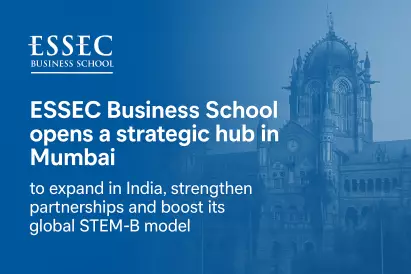Eduniversal Best Masters Ranking in India
In this article, we explore how master’s degree programs in India are transforming by 2025 to align with industry demands, technological advancements, and student expectations. From new specializations to digital delivery formats and global collaborations, the landscape is evolving fast. We’ll also review key opportunities, challenges, and what they mean for students, institutions, and the labor market.
Discover in detail the Master in India
Master’s Degrees in
In 2025, master’s education in India is undergoing a dynamic transformation. Evolving labor market trends, technological innovation, and student expectations are driving major reforms in curriculum design, teaching methodologies, and institutional collaborations. This article breaks down the key trends, challenges, and future opportunities across master’s degree programs in India.
Master’s Degrees in India: Strategic Assets for the 2025 Job Market
By 2025, master's programs in India are more than academic qualifications—they're pivotal tools for economic mobility and professional relevance. As companies emphasize specialized skills, individuals with advanced, flexible, and globally recognized credentials are increasingly in demand.
Master's degrees serve as bridges between undergraduate knowledge and sector-specific expertise, especially in high-growth areas such as technology, healthcare, and business services.
Programs designed around labor market dynamics not only enhance employability but also signal industry readiness and adaptability, two key values in recruitment.
In fields like information systems management and strategy and consulting, these qualifications are viewed as critical for advancement.
Trending Fields and Emerging Specializations
India’s demand for master’s degrees in areas such as data science, AI, cybersecurity, sustainability, and healthcare management is surging.
While traditional sectors like finance continue to be popular, programs are increasingly incorporating technological fluency and interdisciplinary knowledge as core components.
Master’s programs also reflect expanding interest in emerging fields such as cybersecurity and data protection, sustainable innovation, and digital transformation. Institutions are also integrating specialized programs at the intersection of humanities and tech, such as AI ethics or digital anthropology.
As a result, master's programs in domains like Big Data Management and Health Management are becoming increasingly significant for shaping India's next generation of professionals.
Flexible and Interdisciplinary Learning Models
The traditional one-size-fits-all master's program is giving way to modular, flexible pathways designed to accommodate working professionals and diverse learning needs.
Accelerated options, part-time formats, and interdisciplinary curricula ensure students can tailor their education without compromising professional growth.
Master’s offerings that merge domains—like finance with sustainability or law with emerging technologies—are yielding relevance across industry verticals.
These hybrid options align with broader global priorities like ethical governance and digital inclusion.
For example, programs in digital law and new tech law showcase how academia is responding to complex, cross-functional demands.
Digital Transformation in Educational Delivery
In 2025, master’s education in India is deeply intertwined with digital platforms. Online learning, hybrid instruction, and AI-assisted teaching tools are making postgraduate education more accessible and responsive. This shift has opened doors to learners from regional areas and diverse socio-economic backgrounds.
Advanced e-learning capabilities, including virtual classrooms, gamified assessments, and personalized dashboards, enhance engagement and performance. Institutions now optimize course delivery with options that facilitate both synchronous and asynchronous learning—particularly beneficial for India’s growing adult learner base.
This transition aligns with the global orientation of programs like international management and entrepreneurship, broadening access to world-class expertise.
International Partnerships and Global Recognition
Collaborations with international universities are a fast-growing hallmark of Indian master’s programs. These strategic alliances enable joint degrees, faculty exchanges, co-branded certifications, and exposure to global workplace expectations.
Indian institutions are increasingly co-developing courses with counterparts abroad to provide programs with international credibility and appeal.
This trend benefits students and institutions alike, expanding global visibility while enhancing the academic and career value of Indian credentials.
The growth of globally benchmarked programs strengthens India's position in international higher education markets.
Programs in sustainable development and environmental management and energy and natural resources are especially well placed for international expansion and collaboration.
Affordability, Funding, and Access
Even as demand grows, affordability remains a key concern for Indian students. To address costs, universities are collaborating with private funders, launching scholarships, and offering pay-as-you-learn schemes.
Government-supported initiatives and employer-sponsored programs are also playing central roles in expanding access.
The emergence of income-sharing agreements and scalable tuition models ensures financially sustainable access to quality postgraduate education.
Additionally, financing options are focused on high-demand, high-return fields—ensuring that degrees in sectors like quality management unlock professional mobility and ROI for students.
Future Outlook: Opportunities, Innovation, and Equity
Looking ahead, India's master’s education landscape is set to embrace lifelong learning, blended pedagogies, global standards, and more inclusive access. Programs will continue to evolve with curriculum innovation in emerging disciplines and integration of real-world project work.
Entrepreneurial, tech-savvy graduates with interdisciplinary exposure will form the backbone of a workforce ready for a global digital economy.
By fostering international competitiveness through quality assurance, global partnerships, and policy support, India aims to emerge as a world hub for postgraduate excellence.
Opportunities abound in sectors like innovation and project management and rapidly scaling fields such as data analytics, ensuring long-term relevance and global employability.
Discover Eduniversal Best Masters Ranking in India by specialization
Latest news
ESSEC Business School opens a strategic hub in Mumbai to expand in India, strengthen partnerships and boost its global STEM-B model.
SKEMA Business School has opened a new campus in Dubai’s DIFC, one of the Middle East’s top financial hubs. Located near global firms like HSBC and Rothschild, the campus strengthens SKEMA’s international footprint and corporate ties.
Nova SBE partners with Deloitte to launch a five-year scholarship for its Master’s in Finance. The initiative strengthens the Portuguese business school’s position among Europe’s top finance programs and reinforces corporate-backed talent development.



